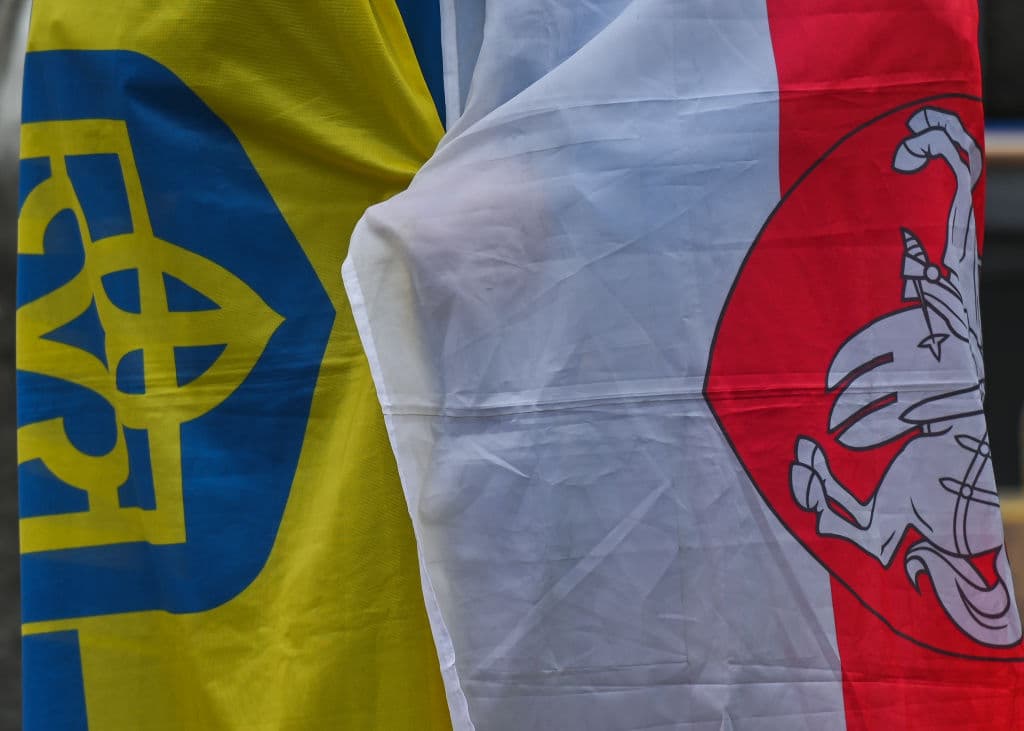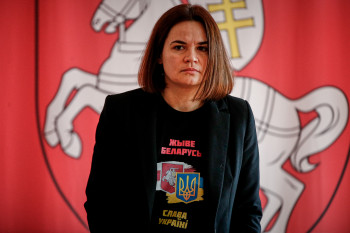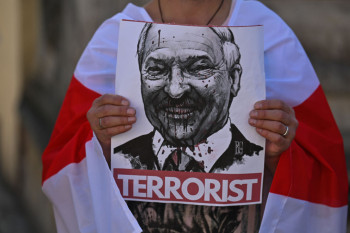Belarus Weekly: Direct Belarusian involvement in Russia’s war would spark ‘massive disobedience,’ Tsikhanouskaya says

Joint Russian-Belarusian flight exercises begin in Belarus.
The Institute for the Study of War notes that Moscow will likely deploy additional forces to Belarus.
Meanwhile, exiled opposition leader Sviatlana Tsikhanouskaya’s in absentia trial begins in Minsk.
She continues to speak out against Belarusian dictator Alexander Lukashenko’s regime, saying that the decision to commit Belarusian troops to Russia’s war would spark “massive disobedience.”
Tsikhanouskaya’s husband, imprisoned political activist Siarhei Tsikhanouski, receives additional charges, potentially adding to his already extensive prison sentence.
Belarusian authorities arrest former presidential candidate Andrei Dzmitryeu, as Lukashenko’s regime continues to crackdown on political opposition.
Joint Russian-Belarusian military flight drills begin
The joint Russian-Belarusian flight exercises started on Jan. 16, according to Belarus’ Defense Ministry.
The ministry noted that the main aim of the exercises is to “increase operational compatibility in the joint performance of combat training tasks.”
The exercise is set to improve air reconnaissance, airborne landings, border patrol, and evacuation of the wounded, the ministry said.
Monitoring group Belarusian Hajun said it did not observe any aircraft taking off on the first day of the drills.
On Jan. 8, Belarus’ Defense Ministry announced a joint Russian-Belarusian flight exercise from Jan. 16 to Feb. 1. The exercise will reportedly involve all of Belarus’ military airfields.
The ministry claimed that the exercise is “not directed against third parties.”
The U.K. Defense Ministry reported on Jan. 11 that the new deployment of Russian aircraft to Belarus is likely a genuine exercise rather than preparation for any additional offensive operations against Ukraine.
However, Ukraine’s General Staff noted that, amid the ongoing exercises, the threat of missile strikes from Belarus against Ukraine is growing.
According to Ukrainian intelligence, as of Jan. 16, there are around 50 Russian aircraft stationed in Belarus, concentrated predominantly at the Machulishchy and Baranavichy airfields.
ISW: Russia likely to deploy more forces to Belarus ahead of September drills
Russia will likely increase its military presence in Belarus prior to its anticipated major exercises in September 2023, according to the Institute for the Study of War (ISW).
Additional Russian forces will likely be deployed to Belarus via the Zapad 2023 and Union Shield 2023 exercises set for September, the ISW said.
Three of four planned Collective Security Treaty Organization (CSTO) drills will be held in Belarus in 2023, the Belarusian Security Council’s First Deputy State Secretary Pavel Muraveiko said on Jan. 15.
The CSTO is an intergovernmental military alliance consisting of Armenia, Belarus, Kazakhstan, Kyrgyzstan, Russia, and Tajikistan.
However, the ISW said it “currently assesses the risk of a Russian invasion of Ukraine from Belarus as low, but possible, and the risk of Belarusian direct involvement as very low.
Belarusian Hajun: Russian troop rotation observed in Belarus
Monitoring group Belarusian Hajun said it observed the rotation of Russian troops stationed in Belarus over the past week. According to Belarusian Hajun, around 1,000 Russian soldiers were sent back to Russia.
There are currently around 11,000 Russian military personnel in Belarus, according to Ukraine’s State Border Guard Service Head Serhii Deineko. He noted that the number is constantly changing due to the ongoing rotation of personnel.
However, Deineko said there hadn’t been an increase in the number of Russian troops stationed at the Ukrainian-Belarusian border.
Tsikhanouskaya: Direct Belarusian involvement in Russia’s war would spark ‘massive disobedience’
Speaking at the World Economic Forum (WEF) in Davos on Jan. 17, exiled Belarusian opposition leader Sviatlana Tsikhanouskaya said Lukashenko would face “massive disobedience” should he engage Belarusian troops directly in Russia’s full-scale war.
“If Lukashenko gives the order to participate, or even if he declares mobilization, which would be the first sign of getting involved, what would happen? Massive disobedience, strikes, and people fleeing Belarus as fast as they could. That is why I doubt Lukashenko is going to give this order,” she said.
However, Tsikhanouskaya noted that “missiles can be launched from Belarus territory at any moment.”
“Lukashenko’s regime isn’t sure that if he sends troops to fight with the Russian army to Ukraine, the Belarus people won’t change sides, hide or betray him, so the status quo is quite comfortable for Lukashenko and (Russian President Vladimir) Putin,” she said.
Lukashenko’s Belarus is a co-belligerent in Russia’s full-scale war against Ukraine, permitting Belarusian territory to be used as a launching pad and training ground for Russian attacks against Ukraine.
Tsikhanouskaya is the first Belarusian leader to have been invited to participate in Davos since 1992.
Tsikhanouskaya’s in absentia trial begins in Minsk
The in absentia trial against Tsikhanouskaya and her colleagues Pavel Latushka, Volha Kavalkova, Maria Maroz, and Siarhei Dyleuski began in Minsk on Jan. 17.
Belarusian authorities launched an in absentia investigation against Tsikhanouskaya and her allies in October 2022, alleging that she committed 10 crimes, including crimes against national security, plotting a coup d’état, and inciting civil unrest.
She’s facing up to 20 years of imprisonment.
“This is a show, a farce, and it has nothing to do with justice,” Tsikhanouskaya said.
Tsikhanouskaya said that when she tried to contact her state-appointed lawyer, he did not return her calls.
If found guilty, opposition leaders may have their assets seized and be deprived of Belarusian citizenship. The measure violates the country’s constitution and the UN Universal Declaration of Human Rights, prohibiting the stripping of citizenship of those who obtained it by birth.
Lukashenko signed legislation permitting trials in absentia in July 2022.
Jailed Tsikhanouski receives additional charges
Belarusian authorities laid additional charges against jailed Belarusian political activist Siarhei Tsikhanouski on Jan. 16, accusing him of allegedly “systematically disobeying the legal requirements” of his sentence and “provoking conflicts, including with cellmates.”
His new charges may result in two years of additional prison time.
The additional sentences came one day prior to the in absentia trial of Tsikhanouski’s wife, opposition leader Tsikhanouskaya.
Tsikhanouski is the first of Lukashenko’s political opponents to have announced his intention to run for presidency in 2020. He was detained in May 2020 and sentenced to 18 years in prison.
In June 2022, Lukashenko’s regime labeled Tsikhanouski a so-called “terrorist.” Belarusian authorities transferred Tsikhanouski to solitary confinement in August 2022.
Former presidential candidate arrested in Minsk
Former presidential candidate Andrei Dzmitryeu, who ran against Belarusian dictator Alexander Lukashenko in 2020, was arrested on Jan. 11.
The 41-year-old is reportedly being held at the infamous Okrestina detention center in Minsk, where human rights activists report numerous tortures of political prisoners. Belarus’ Investigative Committee cited alleged “involvement in extremist activities” as the reason for Dzmitryeu’s arrest.
Dzmitryeu ran against Lukashenko in the 2020 Belarusian presidential election on a campaign to create an interim government and set another presidential election within a year.
France’s Foreign Ministry condemned his detention, calling it a “demonstration of the Belarusian authorities’ continued anti-democracy oppression.”











